It had all started off so well.
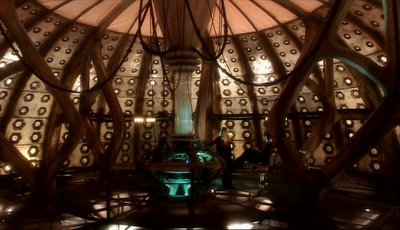
Rose wants to go back in time to 1987 to hold her father’s hand as he dies, after having been run-down by a hit-and-run driver. So, shunning easy excuses, back they go. Easy.
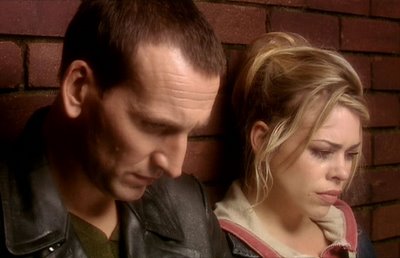
They wait on the corner for him to get hit by the car as though they're waiting to photograph a train.
But once the car has driven off, and Rose’s dad lies motionless in the road, Rose freezes and can’t go through with it. Berating herself afterwards, she asks the Doctor for a second chance, so back they travel again.
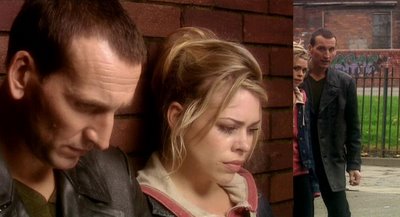
This time they’re watching both Rose’s dad, and their earlier selves watching Rose’s dad.
Best of all, when the car approaches this time, Rose does exactly what anyone would - she runs out, saves her dad, changes history, changes her own history from 18 years ago, changes her own history from 18 minutes ago, and changes The Doctor's history all in one reckless act of free will. Brilliant!
These scenes are great – they’re short and effortlessly accelerate the story towards a head-on exploration of the effects of time-travel.
Oh my gosh - what will happen next? What CAN happen next???
And the answer is, anything that looks cool enough. Oh dear.
Rose 1 has just seen Rose 2 save her dad’s life, so she no longer needs to come back here again.
In other words, Doctor 1 and Rose 1 can never now become Doctor 2 and Rose 2. So Doctor 2 and Rose 2 cannot now exist.
And yet, inexplicably, it’s Doctor 1 and Rose 1 who fade from existance:
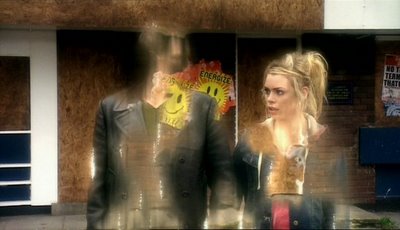
So much for the backbone of time-travel stories – cause and effect.
Indeed, the rest of the episode is packed with causeless effects, and a script that repeatedly betrays its own earlier scenes.
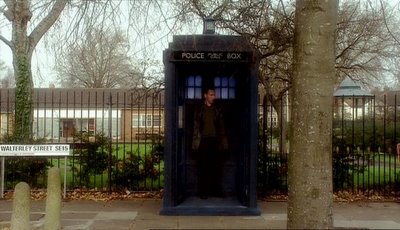
The Doctor gets back to the TARDIS, but finds it's now just an empty Police Box. No cause is ever offered for this.
Everyone's phone starts playing the first ever mobile phone call. No cause is ever offered for this either, nor for why the cars don’t likewise turn into the first ever cars etc.
A song from the future plays on the car radio. Again, with no cause.
Toddler Mickey is in a crowded playground. Eerily, all the other kids, and adults, silently vanish, one at a time, whenever he's looking the other way. Even the woman pushing his swing. Finally young Mickey finds himself completely alone, and flees from the deserted playground in terror.
A few minutes later they tell us what's happened...
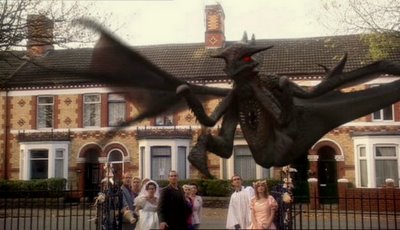
... yes, they tell us they've all been eaten by gigantic black screaming pterodactyl-like monsters, and Mickey simply never noticed any of them.
They don’t eat the Doctor however, preferring to just watch him threateningly. They then eat the kids, a gardener, someone hanging out laundry, and a tramp. When the Doctor’s running into a church, oh yes, then they try to attack him. There’s no explanation for why they wait.
No-one barricaded inside the church thinks to pray.
We're told that these reapers are here to sterilise the wound in time, yet they arrived after the event, not before. And yes, they sterilise the wound in time by eating everyone.
It’s feels like Rose’s dad has to die again to fix everything, so, without any explained cause, the car that killed him repeatedly materialises outside the church (not inside it) to run him down again.
So finally Rose’s dad makes the ultimate sacrifice, and everyone acts like things are okay again, which they’re not.
Many people are now dead. Not the Doctor though, who having been eaten earlier, is wordlessly alive again. We’re not told if he remembers being killed, or if anything happened afterwards. The hit-and-run driver has stopped, presumably with no explanation for why or how his car came to be transported to this part of town. The TARDIS is back somewhere new. Much of Rose’s memory must now be of things that have never happened to her.
The final insult is the Doctor's blanket cliché "They won't remember anything," which a) is followed by a scene in which Jackie does, b) hardly brings the dead back to life, and c) seems to be what the production team condescendingly think of the viewers.
2 things I liked:
a. The Doctor refers to Rose changing her mind about travelling with him when she heard that the TARDIS was also a time machine in episode one. Yep, we had a reference to an earlier episode that was actually TRUE!
b. I identified with The Doctor's line "You two? Street corner. Getting a taxi home. I’ve never had a life like that."
In fact I really enjoyed it while it was on – it had a great feel-good factor - but through the rest of my week I'm just insulted. It, quite literally, doesn't bear thinking about.
Doctor Who has always had its faults, in every era. I just really never expected the era made by a successful fan to care so little about the scripts. Because it really is only the scripts that I have a real problem with. I can accept the effects - good for them for trying. But no-one has tried to make most of these stories work, or if they have, then I think they've given up too early.
A few years ago, three fans got together and wrote a book entitled “The Doctor Who Discontinuity Guide.” It picked apart the storylines of all 600 original episodes, and had great respect for plot-integrity, character-motivation and posessed knowledge. Exactly the sort of understanding this series needs.
Yet one of the three authors of that book is actually credited as the author of this very episode.
Either he’s having a massive laugh, or there is just no way that this is the script he originally submitted.
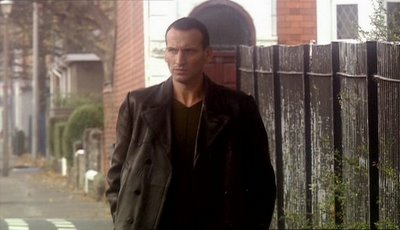
Labels: doctor-who, tv


 :)
:)

 Brett
Brett Random Dave
Random Dave Scottish Dave
Scottish Dave Frank
Frank Greg
Greg Herschel
Herschel Jacob
Jacob Jean
Jean Joe
Joe Jonathan
Jonathan Melissa
Melissa Melva
Melva Paul
Paul The Reynolds
The Reynolds Rhett
Rhett Sara
Sara Sarah
Sarah Tim
Tim My church
My church
0 comment(s):
Post a Comment
<< Back to Steve's home page